|
|
|
Sort Order |
|
|
|
Items / Page
|
|
|
|
|
|
|
| Srl | Item |
| 1 |
ID:
152893
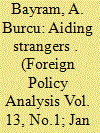

|
|
|
|
|
| Summary/Abstract |
Why do publics in donor countries support development foreign aid? Focusing on material factors, ideology, and identities, the literature has largely neglected the moral basis of foreign aid attitudes. I argue that generalized trust, defined as the belief in the integrity and trustworthiness of people, is a crucial component of the moral calculus of publics in donor countries. Using data from independently conducted surveys of global (World Values Survey) and American mass publics (Core Values Project Survey), I show that generalized trusters are more likely to aid the have-nots of the world than those who lack trust in people. This finding indicates that the bonds of trust expand the boundaries of global justice. By illuminating the role generalized trust plays in shaping donor public attitudes towards development foreign aid, this study helps improve the political economy, ideology, and identity models of aid, contributing to the literatures on foreign aid and foreign policy attitudes, and to theories of cosmopolitan global justice.
|
|
|
|
|
|
|
|
|
|
|
|
|
|
|
|
| 2 |
ID:
141082
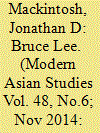

|
|
|
|
|
| Summary/Abstract |
Fist of Fury, starring Bruce Lee, debuted in Japan in 1974. Whilst its critical reception reflected its box-office success, a complex emotional reaction is nevertheless detectable towards the film's unsympathetic portrayal of the Japanese. This paper will explore this reaction and suggest that a post-colonial angst was piqued, one that betrayed fundamental shifts in current racial, erotic, cultural, moral, and historical understandings of Japanese manliness. At one level, the response to Lee is a hermeneutic cue into the manifold ways that this angst was constructed through contesting understandings of an emergent China and unresolved memories concerning failed imperial Japanese adventure. At another level, the phenomenon of Lee's Japanese reception points to longer-term shifts in the visual-cultural representation of masculinity: vulnerability as articulated in the cinema's ‘new man’, male nudity as ‘discovered’ in women's magazines, and most potently, modern Japanese manliness to challenge American neo-colonial hegemony. It is this panorama of masculinity that this paper seeks to open through an inter-disciplinary survey of a variety of media—film, pulp fiction, women's magazines, and homo porn; a panorama into which Bruce Lee exploded on screen, alerting us to the images and contradictory aspirations that script a visual poetry of Japanese manliness.
|
|
|
|
|
|
|
|
|
|
|
|
|
|
|
|
| 3 |
ID:
139967
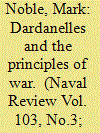

|
|
|
|
|
| Summary/Abstract |
In the centenary year of the dardanelles operation, the author uses the principles of war to analyse some of the reasons for the failure of the campaign.
|
|
|
|
|
|
|
|
|
|
|
|
|
|
|
|
| 4 |
ID:
152356
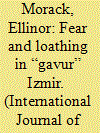

|
|
|
|
|
| Summary/Abstract |
Based on a series of recollections published between January and April 1926 in the Izmir-based daily newspaper Ahenk (Harmony), this article explores how individual Muslim Turks remembered their emotional responses to the Greek occupation of that city (May 1919–September 1922). Analyzing these recollections, it considers why certain events were remembered while others were almost completely left out. By studying how Muslim Turks described their feelings towards the occupying forces, local non-Muslims, and the eventually victorious Turkish army, the article makes an initial contribution to the history of emotions in early republican Turkey. I argue that the composition and consumption of memories were avenues for connecting emotionally to the Turkish nationalist project. This finding challenges the widespread notion that the early republican period was characterized by collective amnesia of the immediate past, and contributes to the growing body of scholarship on popular participation in early republican nationalism.
|
|
|
|
|
|
|
|
|
|
|
|
|
|
|
|
| 5 |
ID:
046949
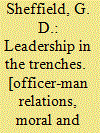

|
|
|
|
|
| Publication |
Houndmills, Macmillan Press Ltd., 2000.
|
| Description |
xxiv, 270p.
|
| Series |
Studies in military and strategic history, ISBN 0333710460
|
| Standard Number |
0333654110
|
|
|
|
|
|
|
|
|
|
|
|
Copies: C:1/I:0,R:0,Q:0
Circulation
| Accession# | Call# | Current Location | Status | Policy | Location |
| 044267 | 355.1230941/SHE 044267 | Main | On Shelf | General | |
|
|
|
|
| 6 |
ID:
139728
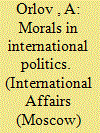

|
|
|
|
|
| Summary/Abstract |
THE WORLD is changing fast; it is changing by leaps and bounds which makes it next to impossible to explain what is going on and to foresee possible repercussions. An unsophisticated observer in the West and elsewhere in the world where Western propaganda is heard and believed might imagine that the forces of freedom and democracy are waging an uncompromising struggle against despotism and tyranny (in the widest sense of the terms). It is implied that the United States and the rest of the civilized West are on the side of the forces of good confronted by an obscure conglomerate of the forces of evil, of which Russia is part if according to President Obama and certain other Western leaders. Former President of France Valéry Giscard d'Estaing has written in his memoirs that according to this interpretation the forces of good insist on democratic elections, human rights, and freedom of trade; America does not hesitate to use its might to defend good and oppose the forces of evil interfering with the fulfillment of these ideals.
|
|
|
|
|
|
|
|
|
|
|
|
|
|
|
|
|
|
|
|
|